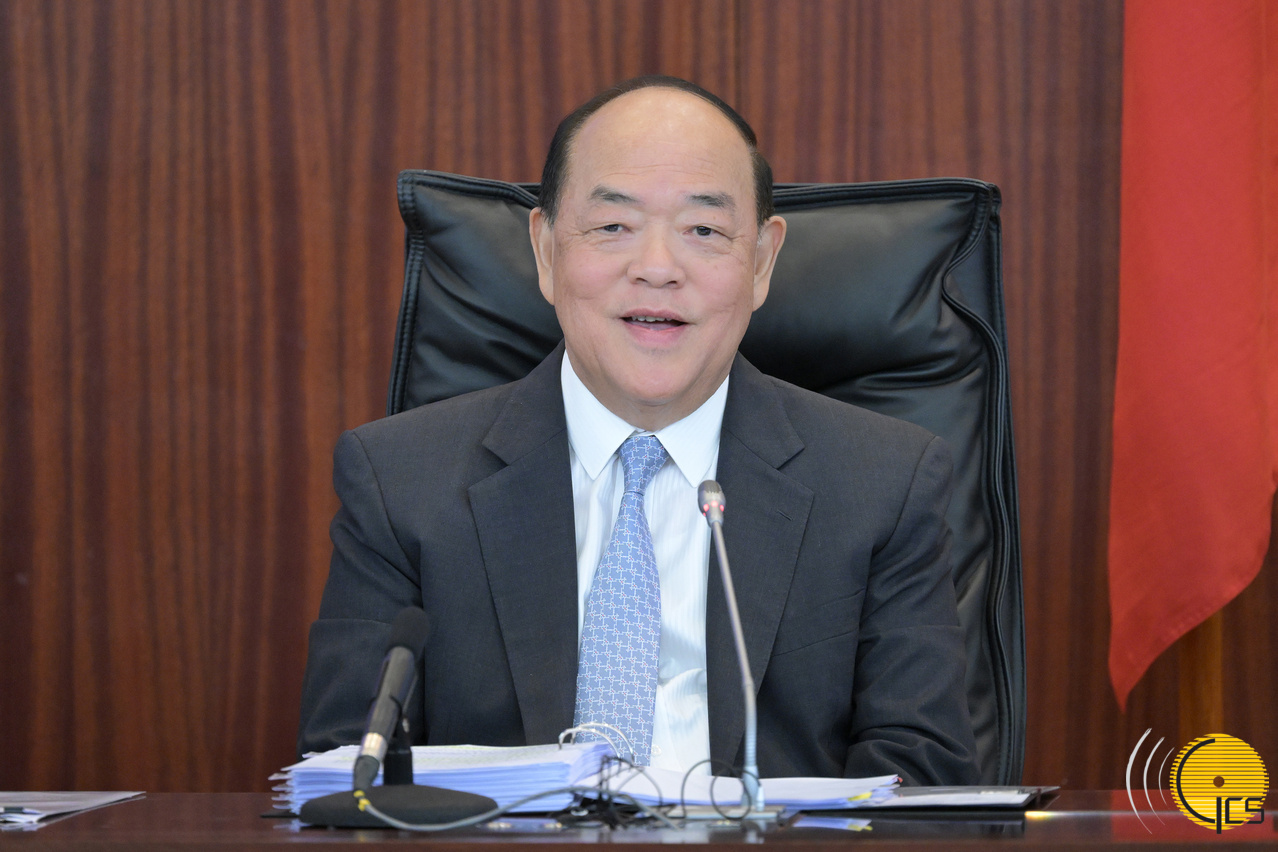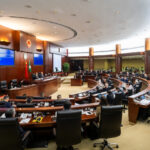 The Chief Executive, Mr Ho Iat Seng, attends a plenary session of the Legislative Assembly to answer Legislative Assembly members' questions on Government policy and social issues.
The Chief Executive, Mr Ho Iat Seng, attends a plenary session of the Legislative Assembly to answer Legislative Assembly members' questions on Government policy and social issues.
The Chief Executive, Mr Ho Iat Seng, stressed the Government was committed to its “1+4” development strategy for adequate economic diversification, allocating the qualified people required to move ahead such strategy, and creating a cornerstone for high-quality development.
Mr Ho attended a plenary session of the Legislative Assembly on Tuesday (16 April) to answer Legislative Assembly members’ questions on Government policy and social issues.
Mr Ho said that the Government had a complete plan for policies related to talent acquisition. In August 2023, a talent recruitment scheme had been launched to attract to Macao high-end and outstanding people, and advanced professionals.
The Talent Development Committee had already held a meeting to review the effectiveness of the scheme. Macao needed not to attract such people on a large scale, but rather to attract those that would fit the “1+4” development strategy for adequate economic diversification, said Mr Ho. As of March 2024, the Government had received more than a thousand applications from qualified persons, including academics and industry leaders, gold-medal athletes and core managers of well-known mainland and foreign companies. In the next step, the Committee planned to provide a range of supporting services to qualified persons to help them adapt to developing Macao industries.
Mr Ho added that the Committee was preparing the second phase of the talent recruitment scheme, and was looking at the possibility of accepting applications from non-local students who are studying in "1+4" industrial development-related fields in local higher education institutions, and whose grades meet high standards. Their areas of study needed to be conducive to the development of Macao, noted the Chief Executive.
It was believed that this would also enhance the educational environment of universities and other institutions, and their competitiveness. In addition, the Government welcomed those Macao students studying abroad, as well as other talented local individuals currently outside the city, to return to Macao. The Committee would also in the near future look to recruit talented people from overseas.
During the plenary session, the Chief Executive talked about Macao's efforts in becoming a "City of Performing Arts". Mr Ho said that when the Government signed concession contracts with the city’s six integrated resort and leisure enterprises, they were required to develop non-gaming elements. In the past year, Macao had held many concerts in indoor performance venues that could accommodate more than 10,000 people. The venues, lighting, sound, and other equipment were advanced. On this basis, the Government had conceived the idea of building Macao into a "City of Performing Arts", with the support of the Ministry of Culture and Tourism of China. The Government was considering using idle land to build a performance venue that could accommodate 50,000 people. It was expected that construction would start soon and hoped to be completed by the end of this year.
Regarding the use of the land formerly occupied by Macau Jockey Club, Mr Ho said it was an important resource for Macao and would be included in the Government's long-term land planning. The Government hoped to build a multifunctional venue for events; one that could run in alignment with development of Cotai. The former Macau Jockey Club land would not be used for gaming or housing purposes.
In response to concerns regarding the impact of the birth rate on the development of non-higher education, the Chief Executive said that there were no more than 4,000 newborn babies in Macao in 2023. A declining birth rate was a global trend. The decrease in the number of students had also affected the enrolment level in local kindergarten and primary education. Mr Ho pointed out that the Government's investment in educational resources had not decreased.
When establishing the law called “System Framework for Private School Teaching Staff of Non-tertiary Education”, provision of training courses for teaching staff at different stages of education was taken into consideration in order to improve the quality of teachers and strengthen science and technology education. Schools needed to continue to improve teaching quality and attract more students to enrol.
As for housing units for the elderly, the Chief Executive said that the 1,500 applications received by the Government had been added to the first round of requests. As long as the first batch of qualified applicants selected a unit and signed an occupancy agreement within the specified time, they would be eligible for a 20-percent discount on usage fees for the first three years. The list of successful applicants would be announced as soon as possible. As for a balance of 300-odd units, they were still undergoing interior renovation and setting up of supporting facilities, said Mr Ho.
According to statistical information, there were about 750 elderly people in Macao who needed home-delivery of meals daily by relevant organisations. The Government was reviewing whether these individuals had also applied for the available housing for the elderly. If they had not applied, the Government would seek to find out why. The Government would implement effectively the work on housing units for the elderly, and provide service facilities for residents, said the Chief Executive. The accommodation provided would have, within the same complex, restaurants, supermarkets, and other shops. The Government encouraged such companies to recruit as employees healthy elderly residents living in the units.
Regarding the process of urban renewal in Macao, the Chief Executive said that successive governments had been committed to urban renewal work. Among such work, the urban renewal project of Iao Hon Estate involved more than 2,000 households. Therefore, the Government had built more than 2,000 temporary housing units in Lot P in Areia Preta. The relevant housing stock could accommodate all residents of Iao Hon Estate willing to leave their property while it was being redeveloped.
Interim housing units were expected to be available by the end of this year. Son Lei House on Iao Hon Estate would be the first property to undergo reconstruction, later this year. The Government had entrusted Macau Urban Renewal Limited to carry out the planning. It hoped to use the redevelopment of Son Lei House as a model to let other Iao Hon Estate residents understand the steps involved in reconstruction.
This year marks the 10th anniversary of the proposal for a holistic approach to national security. The Chief Executive said that previous and the Governments had always attached great importance to national security. Currently, the five Government secretaries were working together to carry out national security work in an all-round way.
In this regard, Mr Ho said the "Oath of Office" bill added provisions for the oath-taking of members appointed for the Electoral Affairs Commission for the Chief Executive Election, and improved the requirements for oath-taking protocols and the oath-taking system. The oaths and oath-taking procedures for public servants would also be further improved. At the same time, the Government had continued to implement the enforcement mechanism for safeguarding national security and improved a series of regulations and guidelines on network security.
In terms of patriotic education, the Education and Youth Development Bureau would continue to strengthen education – at different levels – regarding loving for the Country and for Macao, including revising basic academic requirements related to national security education content, and requesting higher education institutions to set up patriotic education content for new or revised bachelor's degree courses launched in the future.
For general education subjects, six volumes of supplementary materials on national security education would be published in the new school year to support schools in carrying out national security work. All schools and higher education institutions would display and hoist the national flag on school days.



